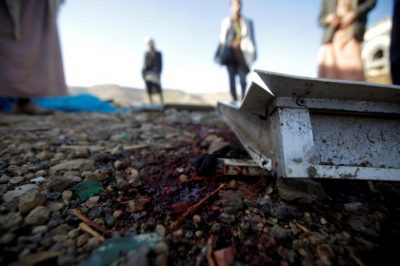War on Yemen: Dozens Dead After Saudi Air Strike Hits Hospital and Market in Hodeidah
Saudi-led coalition denies responsibility, despite being the only air force operating in the area

Note to readers: please click the share buttons above
Air strikes thought to be conducted by the Saudi-led coalition have hit a hospital’s entrance, fishing port and fish market in the Yemeni city of Hodeidah, killing scores.
A source at Hodeidah’s health office told Middle East Eye that 55 people were killed in the strikes, with more than 100 wounded. Both figures are likely to rise as the situation becomes clearer.
The International Committee of the Red Cross said on Twitter it was sending medical equipment to al-Thawra Hospital to treat those in critical condition following the attack.
The hospital said in a tweet that a strike targeted its main gate, leaving dozens of casualties, while Houthi-run Saba news agency said 40 were killed in the hospital strike.
“It is a very painful sight, parts of bodies are everywhere around the hospital gates,” an eyewitness told Reuters.
Staff working for Save the Children, which runs a diphtheria treatment centre in the hospital, described the situation aftert the strikes as “chaos”.
“A bomb exploded just outside the hospital, on the street,” one staff member said. “Then there was another explosion towards the back. I saw people running and bodies in the street.”
Despite the Houthis’ lack of an air force, the Saudi-led coalition laid the blame at the rebels’ door, and insisted it was not behind the strike.
“The coalition did not carry out any operations in Hodeidah today,” the coalition spokesman, Colonel Turki al-Malki, told Al-Arabiya television. “The Houthi militia are behind killing of civilians in Hodeidah on Thursday,” he said.
“The coalition follows a strict and transparent approach based on the international law. We pursue any allegations and if there is any responsibility we will hold it transparently,” he added.
Pro-Yemeni government activists and media accused the Houthis of targeting the civilians with ballistic missiles, but residents in the rebel-held city told MEE that they heard the buzzing of warplanes.
Meanwhile, the United Nations said it will invite the parties involved in Yemen’s conflict for talks on 6 September.
UN Special Envoy to Yemen Martin Griffiths told the UN Security Council that “a political solution” to end the war in Yemen is “available” and urged world powers to support the new push for peace negotiations.
“These consultations will provide the opportunity for the parties, among other things, to discuss the framework for negotiations, relevant confidence-building measures and specific plans for moving the process forward,” said Griffiths.
Strategic port city
Saudi Arabia, the United Arab Emirates and Sunni Muslim allies have been fighting in Yemen with Western backing for more than three years against the Iran-aligned Houthis.
The Houthis control much of north Yemen including the capital Sanaa and drove its Saudi-backed government into exile in 2014.
On Tuesday, the Houthis said they were unilaterally halting attacks in the Red Sea for two weeks to support peace efforts.
This came a few days after Saudi Arabia suspended oil exports through a strategic Red Sea channel, amid Houthi attacks on crude tankers on 25 July.
About 70 percent of Yemen’s food imports flow through Hodeidah port; about 8.4 million Yemenis are said by aid workers to be on the verge of starvation.
On 13 June, Saudi Arabia and its allies in a pro-government coalition launched a major offensive to retake Hodeidah. Fighting around the port has raised UN fears of a new humanitarian catastrophe in a country already at the brink of famine and a deadly cholera epidemic.
The Houthis have offered to hand over management of the port to the world body, according to the United Nations, but the coalition says the group must quit the western coast.
On Friday, the UN’s World Health Organisation said Yemen may be on the brink of a new cholera epidemic, with greater chance of a high death rate due to widespread malnutrition.
“We’re calling on all parties to the conflict … for three full days of tranquility and to lay down arms to allow us to vaccinate the civilian population for cholera,” WHO emergency response chief Peter Salama said.
*
Featured image is from The Wire.

